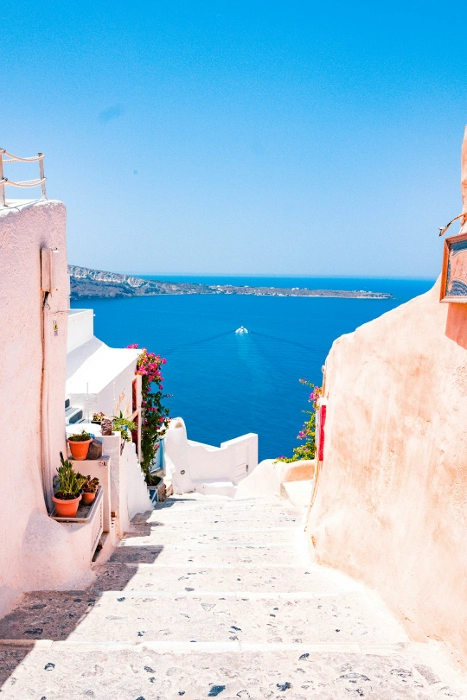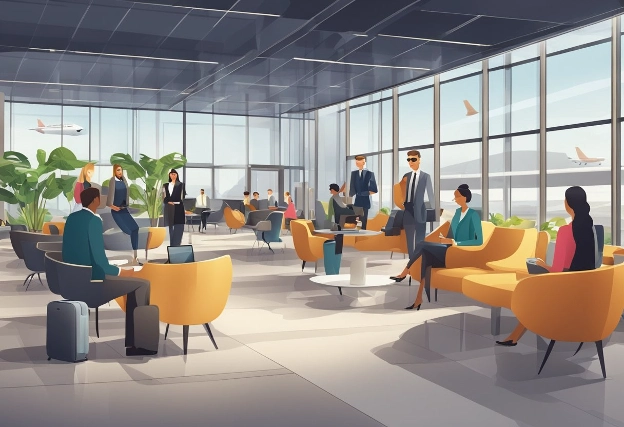Business Travelers Sustainable Luxury: Redefining Premium Experiences

-
Understanding Sustainable Luxury Travel
- Defining Sustainable and Luxury
- Evolution of Luxury Travel Toward Sustainability
- Sustainability Policy and Eco-Certifications
-
The Business Traveler's Shift to Green
- Market Trends Among Business Travelers
- The Pandemic's Influence on Sustainable Tourism
- Traveler's Attitudes Towards Eco-Friendly Policies
-
Economic Implications of Sustainable Luxury Travel
- Cost vs. Impact: Balancing Budget with Ethics
- Investment in Renewable Energy and Local Communities
- Sustainable Tourism as a Driver for New Markets
-
Environmental Impact of Luxury Travel
- Carbon Emission Metrics and Air Travel
- Reducing the Use of Single-Use Plastics
- Conservation Efforts in Destinations
-
Strategies for Implementing Sustainable Practices
- Communication and Transparency with Stakeholders
- Effective Management of Logistics and Supply Chains
- Regulatory Compliance and Meeting Ethical Standards
-
Cultural and Social Dimensions of Luxury Travel
- The Role of Heritage and Community in Luxury Tourism
- Addressing Overtourism and Supporting Less-Touristed Destinations
- Promoting Wildlife Conservation and Cultural Preservation
-
Key Insights and Future Directions
- Emerging Innovations in Luxury Travel
- Building Consumer Trust Through Sustainable Efforts
- Anticipating the Next Wave of Sustainable Travel Trends
-
Frequently Asked Questions
- How are luxury hotels integrating sustainability into their services for business travelers?
- What are environmentally friendly practices adopted by luxury travel companies?
- What amenities do sustainable luxury accommodations offer to appeal to eco-conscious business travelers?
- How do business travel policies incorporate sustainability when selecting luxury accommodations?
- What is the impact of sustainable luxury travel on local communities and economies?
- How can business travelers ensure their luxury experiences are aligned with sustainability goals?
Business Travelers Sustainable Luxury: Redefining Premium Experiences
Business travelers are increasingly prioritizing sustainable luxury as they look for ways to balance comfort with environmental responsibility. This shift isn't just about reducing carbon footprints; it's about embracing a new mindset that values authentic experiences and cultural respect.
You're part of a growing trend where luxury doesn't have to mean waste. From eco-friendly hotels to sustainable travel options, the choices available to you are expanding rapidly. According to McKinsey, many luxury travelers today are under the age of 60 and not necessarily from Western countries, indicating a broad interest in sustainable travel from diverse demographics.
Understanding the economic and environmental impacts of your travel choices can help you make more informed decisions. The demand for luxury tourism is projected to grow faster than other segments, making it crucial to adopt sustainable practices now. Whether you're staying at a sustainable luxury hotel or choosing a travel service that prioritizes green initiatives, your choices can contribute to a more sustainable future.
Key Takeaways
Business travelers are focusing on sustainable luxury.
Demand for luxury tourism is growing, emphasizing green choices.
Your travel decisions can impact both the economy and the environment.
Understanding Sustainable Luxury Travel
Sustainable luxury travel combines high-end experiences with eco-friendly and responsible tourism practices. Understanding this concept involves exploring definitions, historical shifts, and current policies.
Defining Sustainable and Luxury
Sustainable travel involves practices that minimize negative impacts on the environment and local communities. This includes reducing carbon footprints, supporting local economies, and conserving natural resources. Luxury travel, on the other hand, focuses on high comfort, quality services, and exclusive experiences. Combining these two can create a travel experience that is both lavish and environmentally friendly. For instance, staying in eco-lodges that provide five-star amenities without harming the planet can be a part of sustainable luxury travel.
Evolution of Luxury Travel Toward Sustainability
The shift toward sustainability in luxury travel has been significant in recent years. Initially, luxury travel was associated with opulence often at the expense of environmental concerns. Today, many high-end travelers are prioritizing eco-friendly choices. For example, sustainable tourism has become a major trend, with travelers seeking destinations that offer both luxury and positive environmental impacts. Innovative brands are incorporating green technologies and supporting conservation efforts.
Sustainability Policy and Eco-Certifications
Policies and certifications play a crucial role in sustainable luxury travel. Many travel companies and accommodations are developing strict sustainability policies that include energy conservation, waste reduction, and community engagement. Eco-certifications, such as the Green Key or EarthCheck, indicate that a business meets high environmental standards. These certifications help travelers identify which companies are genuinely committed to sustainable practices, ensuring that their travel choices support global sustainability efforts.
By understanding these aspects, you can make informed decisions that align with both luxury and sustainability values.
The Business Traveler's Shift to Green
The shift towards sustainability in business travel has been influenced by changing market trends, the COVID-19 pandemic, and growing support for eco-friendly policies. These changes reflect a broader movement towards responsible tourism.
Market Trends Among Business Travelers
Business travel is increasingly focused on sustainability. Surveys show that many companies are setting goals to reduce their carbon footprints. Sustainable Tourism is a fast-growing segment, with more companies encouraging eco-friendly travel methods like trains over short flights to cut emissions.
Slow Travel is also gaining popularity. This involves longer stays in fewer destinations to minimize travel frequency. According to recent trend reports, 74% of travel managers now recommend or require employees to combine multiple trips into one. This reduces both costs and environmental impact, supporting the growing demand for green travel.
The Pandemic's Influence on Sustainable Tourism
The COVID-19 pandemic has drastically reshaped how people travel for business. During the pandemic, there was a significant reduction in travel, giving many businesses a chance to rethink their strategies. The Conscious Comeback is evident as companies adopt sustainable practices learned during this period.
Virtual meetings became the norm, and Business Travel reduced considerably, lowering greenhouse gas emissions. As in-person meetings start again, there is a focus on environmentally friendly practices. Hybrid events that mix physical and digital attendance are becoming more common, reducing the need for extensive travel and supporting sustainability goals.
Traveler's Attitudes Towards Eco-Friendly Policies
Millennials strongly support eco-friendly travel and policies. They prefer companies that align with their values on environmental responsibility. Surveys indicate that a significant majority of younger business travelers are willing to pay more for sustainable options.
Companies are responding by adopting green policies such as using Eco-Friendly Hotels and prioritizing suppliers with strong environmental credentials. Employees are being encouraged to use less polluting modes of transport and integrate eco-friendly practices into their routines.
Overall, there's a clear shift towards sustainability in business travel driven by both corporate policies and individual preferences, reflecting the growing emphasis on responsible tourism and environmental stewardship.
Economic Implications of Sustainable Luxury Travel
Sustainable luxury travel provides economic benefits by balancing costs and impacts. It also drives investments in renewable energy and boosts local economies, creating new markets and opportunities.
Cost vs. Impact: Balancing Budget with Ethics
In sustainable travel, balancing budget with ethical practices is crucial. While initial costs for adopting eco-friendly measures can be high, the long-term savings and positive impact make them worthwhile. For instance, energy-efficient technologies lower operating costs over time. Additionally, travelers are willing to pay premium prices for sustainable options, which can lead to increased revenue.
Luxury travel businesses must weigh these factors carefully. Lowering the carbon footprint can be costly, but it often results in higher customer satisfaction and loyalty. This trade-off between immediate expenses and future gains is a key consideration for companies aiming to align financial goals with ethical values.
Investment in Renewable Energy and Local Communities
Investing in renewable energy and supporting local communities are central to sustainable luxury travel. For example, luxury hotels might install solar panels or wind turbines to reduce reliance on non-renewable energy sources. This not only cuts costs but also appeals to eco-conscious travelers.
Supporting community projects, like local schools or healthcare, boosts the economy and strengthens brand reputation. Travelers enjoy authentic experiences and contribute positively to the destinations they visit. This investment creates a cycle of benefits—improving local infrastructure while attracting more visitors who value responsible tourism.
Sustainable Tourism as a Driver for New Markets
Sustainable tourism opens doors to new market opportunities. As more travelers seek eco-friendly options, businesses can innovate to meet these demands. Offering packages that focus on sustainability can attract younger, high-net-worth individuals interested in philanthropy and environmental conservation.
New markets such as eco-lodges and green tours are emerging, driven by consumer preferences for sustainability. These innovations not only diversify business offerings but also ensure long-term growth. Embracing sustainable practices can turn these market trends into profitable ventures, making it a win-win for both travelers and businesses.
Environmental Impact of Luxury Travel
Luxury travel significantly affects the environment. The key factors include carbon emissions from flights, the prevalence of single-use plastics, and the state of local conservation efforts at popular destinations.
Carbon Emission Metrics and Air Travel
Air travel is one of the largest contributors to carbon emissions in luxury travel. Long-haul flights use large amounts of aviation fuel, leading to increased greenhouse gas emissions. Private jets, often used by luxury travelers, exacerbate this issue due to lower occupancy rates compared to commercial flights.
Key Metrics:
Commercial Flights: Approximately 90 grams of CO2 per passenger per kilometer.
Private Jets: Can emit 10 times more CO2 per passenger than commercial flights.
To mitigate these effects, some airlines and travel brands are investing in carbon offset programs. These programs fund reforestation projects or renewable energy initiatives to balance out the emissions produced during travel.
Reducing the Use of Single-Use Plastics
Single-use plastics are another significant environmental concern in luxury travel. Hotels, resorts, and airlines often rely on items like plastic bottles, straws, and packaging, which contribute to pollution and harm marine life.
Strategies to Reduce Single-Use Plastics:
Hotels and Resorts: Implement refillable toiletry dispensers and provide reusable water bottles.
Airlines: Switch to biodegradable or reusable cutlery and serveware.
Travelers: Bring personal reusable items like water bottles and toiletry containers.
By making these changes, the luxury travel industry can reduce its environmental footprint and promote a culture of sustainability among travelers.
Conservation Efforts in Destinations
Luxury travel destinations can significantly impact local environments. Many popular spots are taking steps to preserve their natural beauty and biodiversity. Conservation efforts focus on protecting ecosystems, wildlife, and cultural heritage sites.
Examples of Conservation Efforts:
Bali: Coral restoration projects to protect marine biodiversity.
Costa Rica: Eco-lodges that support rainforest conservation and local communities.
Botswana: Safaris that contribute to wildlife preservation and anti-poaching initiatives.
Supporting these conservation initiatives not only protects the environment but also enriches the travel experience by maintaining the natural and cultural assets of destinations.
Strategies for Implementing Sustainable Practices
To make business travel more sustainable in luxury hotels, it is essential to focus on communication, supply chain management, and regulatory compliance. These strategies ensure trust and transparency among stakeholders, leading to responsible and ethical practices.
Communication and Transparency with Stakeholders
You need to foster open lines of communication with all stakeholders, including employees, guests, and investors. Share detailed updates about your sustainability goals and progress. Being transparent builds trust and can enhance your brand's reputation.
Use various platforms such as newsletters, social media, and internal meetings to keep stakeholders informed. Highlight achievements and be honest about challenges. Providing visual data, like charts and infographics, can make information more accessible and engaging. Encourage feedback and be receptive to suggestions for improvement.
Effective Management of Logistics and Supply Chains
Managing logistics and supply chains effectively is crucial for sustainability. Opt for local suppliers to reduce transportation emissions and support the local economy. Ensure that your suppliers also adhere to sustainable practices. This not only helps reduce your carbon footprint but also encourages a broader adoption of responsible travel practices.
Implement a system for tracking and evaluating the environmental impact of your supply chain. This can include regular audits and sustainability assessments. Use technology to optimize logistics routes and reduce unnecessary travel. Transparency in your supply chain can also boost trust among your guests and stakeholders.
Regulatory Compliance and Meeting Ethical Standards
Ensure that your practices comply with local and international regulations regarding sustainability. This involves staying updated on new laws and standards. Develop a compliance checklist that includes environmental regulations, waste management, and energy use.
Meeting ethical standards goes beyond compliance. It involves adopting practices that exceed basic requirements. For instance, you can invest in renewable energy sources like solar and wind power. Always source materials responsibly and ensure fair labor practices within your supply chain. Ethical compliance not only helps avoid legal issues but also strengthens your brand's commitment to sustainability.
By focusing on these strategies, you can create a sustainable, ethical, and transparent environment for your business travelers.
Cultural and Social Dimensions of Luxury Travel
Luxury travel today goes beyond comfort and elegance. It emphasizes cultural immersion, social responsibility, and sustainability, making travel experiences more authentic and beneficial for both visitors and the host communities.
The Role of Heritage and Community in Luxury Tourism
Respecting and engaging with local culture has become critical in luxury tourism. Affluent consumers now seek destinations where they can connect with the heritage of a place. This might include visiting ancient heritage sites, participating in traditional ceremonies, or learning local crafts.
These practices not only enrich the traveler’s experience but also support the local economy. Travelers spend money on locally made crafts, traditional foods, and community-led tours. This promotes a cycle of economic benefit that bolsters the community.
Addressing Overtourism and Supporting Less-Touristed Destinations
Overtourism is a significant concern for popular destinations. Luxury travel prioritizes responsible practices by encouraging visits to less-touristed destinations. This approach helps balance tourist traffic, preserving the integrity and charm of overvisited sites.
When affluent consumers explore less-known places, they bring economic opportunities to these regions. This strategy alleviates pressure on crowded hotspots and contributes to the sustainable growth of smaller communities.
Travel companies also implement environmentally friendly practices to minimize impact. They emphasize reducing waste, cutting down on emissions, and adhering to local environmental laws.
Promoting Wildlife Conservation and Cultural Preservation
Wildlife conservation is an essential aspect of sustainable luxury travel. African safaris, for instance, attract travelers willing to invest in experiences that support conservation efforts. These trips often contribute to the funding needed to protect endangered species and their habitats.
Supporting local cultural heritage is another priority. Luxury travelers engage in activities that help preserve intangible cultural assets like language, folklore, and traditional knowledge. This attention to preservation ensures that cultural treasures endure for future generations.
Travelers are encouraged to participate in programs that benefit both wildlife and community welfare. This holistic approach enhances the overall travel experience while ensuring sustainability and responsible tourism practices.
Key Insights and Future Directions
Sustainable luxury in business travel is rapidly gaining momentum, driven by innovations and heightened consumer demand for eco-friendly options. These key areas focus on the latest innovations, the role of consumer trust, and upcoming trends in sustainable travel.
Emerging Innovations in Luxury Travel
The travel industry is embracing various innovations to foster sustainability. Electric and hybrid transportation options are becoming more prevalent, reducing carbon footprints. Renewable energy sources in accommodations are another critical aspect. Some hotels now use solar and wind power, aligning luxury with eco-friendliness. Additionally, artificial intelligence helps optimize travel plans, minimizing unnecessary emissions. These advancements ensure you experience luxury without compromising environmental responsibility.
Building Consumer Trust Through Sustainable Efforts
Establishing trust with consumers is crucial for the success of sustainable luxury travel. Transparency in business practices is key. Companies are now sharing details on their carbon offset programs and ethical sourcing. Engaging with green certifications bolsters credibility. Consumer trust grows when companies demonstrate genuine commitment to sustainability. This trust is essential for encouraging repeat business and building a loyal customer base.
Anticipating the Next Wave of Sustainable Travel Trends
Future sustainable travel trends center on immersive and mindful experiences. Travelers increasingly seek wellness-focused trips that incorporate health and mindfulness activities. Eco-friendly destinations and stays are on the rise. Climate-conscious tourism is shaping up as a significant trend, urging travelers to choose less crowded and more environmentally friendly locations. Innovative measures such as carbon-neutral travel packages will likely become more common, pushing the boundaries of luxury and sustainability.
Frequently Asked Questions
Luxury hotels and travel companies are increasingly incorporating sustainability into their services to appeal to eco-conscious business travelers. These initiatives include sustainable practices, special amenities, and thoughtful policies that benefit both travelers and local communities.
How are luxury hotels integrating sustainability into their services for business travelers?
Luxury hotels are implementing measures like using energy-efficient lighting, reducing water consumption, and offering organic, locally sourced food. Some also focus on reducing plastic usage by providing reusable alternatives. Additionally, many hotels support local communities through fair trade practices and cultural preservation efforts.
What are environmentally friendly practices adopted by luxury travel companies?
Luxury travel companies adopt environmentally friendly practices such as using hybrid or electric vehicles, supporting eco-friendly airlines, and engaging in carbon offset programs. They also focus on minimizing waste and promoting responsible tourism that ensures the preservation of natural and cultural heritage.
What amenities do sustainable luxury accommodations offer to appeal to eco-conscious business travelers?
Sustainable luxury accommodations offer amenities like eco-friendly toiletries, energy-efficient appliances, and organic food options. You may also find features such as rainwater harvesting systems, solar panels, and sustainable landscaping. These accommodations often provide information on their sustainability practices to educate and engage guests.
How do business travel policies incorporate sustainability when selecting luxury accommodations?
Business travel policies prioritize accommodations that demonstrate a commitment to sustainability. This includes evaluating hotels and resorts based on their environmental certifications, sustainable practices, and community engagement. Companies may also consider the carbon footprint of their travel and choose options that align with their sustainability goals.
What is the impact of sustainable luxury travel on local communities and economies?
Sustainable luxury travel positively impacts local communities by supporting local businesses, employment, and fair trade practices. It encourages the preservation of cultural heritage and natural resources. This type of travel often leads to improved infrastructure and increased awareness about the benefits of sustainable practices.
How can business travelers ensure their luxury experiences are aligned with sustainability goals?
Business travelers can align their travel experiences with sustainability goals by choosing accommodations and services that prioritize eco-friendly practices. Research hotels and travel companies with strong sustainability commitments, and consider environmentally friendly transportation options. Additionally, travelers can engage in responsible behaviors, such as minimizing waste and supporting local businesses.
-
Understanding Sustainable Luxury Travel
- Defining Sustainable and Luxury
- Evolution of Luxury Travel Toward Sustainability
- Sustainability Policy and Eco-Certifications
-
The Business Traveler's Shift to Green
- Market Trends Among Business Travelers
- The Pandemic's Influence on Sustainable Tourism
- Traveler's Attitudes Towards Eco-Friendly Policies
-
Economic Implications of Sustainable Luxury Travel
- Cost vs. Impact: Balancing Budget with Ethics
- Investment in Renewable Energy and Local Communities
- Sustainable Tourism as a Driver for New Markets
-
Environmental Impact of Luxury Travel
- Carbon Emission Metrics and Air Travel
- Reducing the Use of Single-Use Plastics
- Conservation Efforts in Destinations
-
Strategies for Implementing Sustainable Practices
- Communication and Transparency with Stakeholders
- Effective Management of Logistics and Supply Chains
- Regulatory Compliance and Meeting Ethical Standards
-
Cultural and Social Dimensions of Luxury Travel
- The Role of Heritage and Community in Luxury Tourism
- Addressing Overtourism and Supporting Less-Touristed Destinations
- Promoting Wildlife Conservation and Cultural Preservation
-
Key Insights and Future Directions
- Emerging Innovations in Luxury Travel
- Building Consumer Trust Through Sustainable Efforts
- Anticipating the Next Wave of Sustainable Travel Trends
-
Frequently Asked Questions
- How are luxury hotels integrating sustainability into their services for business travelers?
- What are environmentally friendly practices adopted by luxury travel companies?
- What amenities do sustainable luxury accommodations offer to appeal to eco-conscious business travelers?
- How do business travel policies incorporate sustainability when selecting luxury accommodations?
- What is the impact of sustainable luxury travel on local communities and economies?
- How can business travelers ensure their luxury experiences are aligned with sustainability goals?









